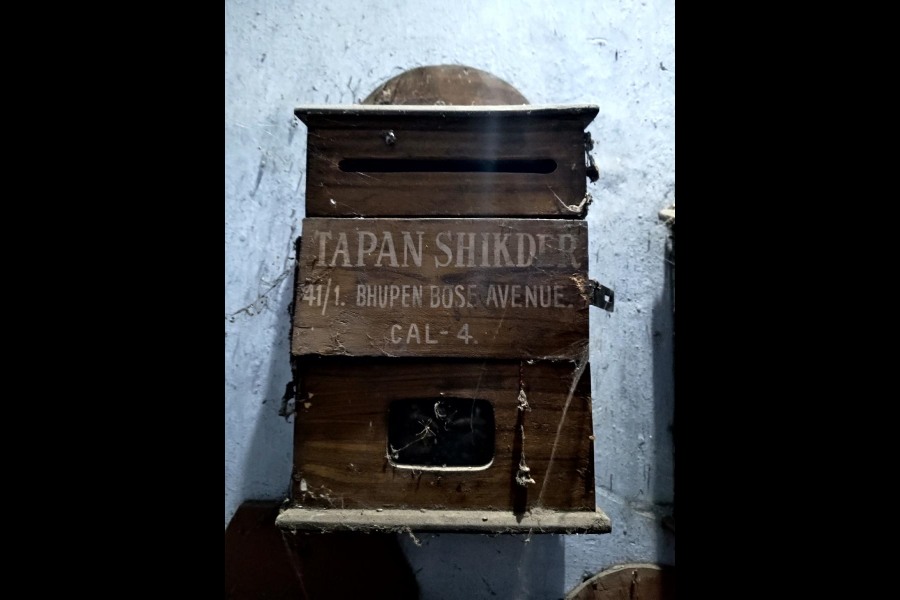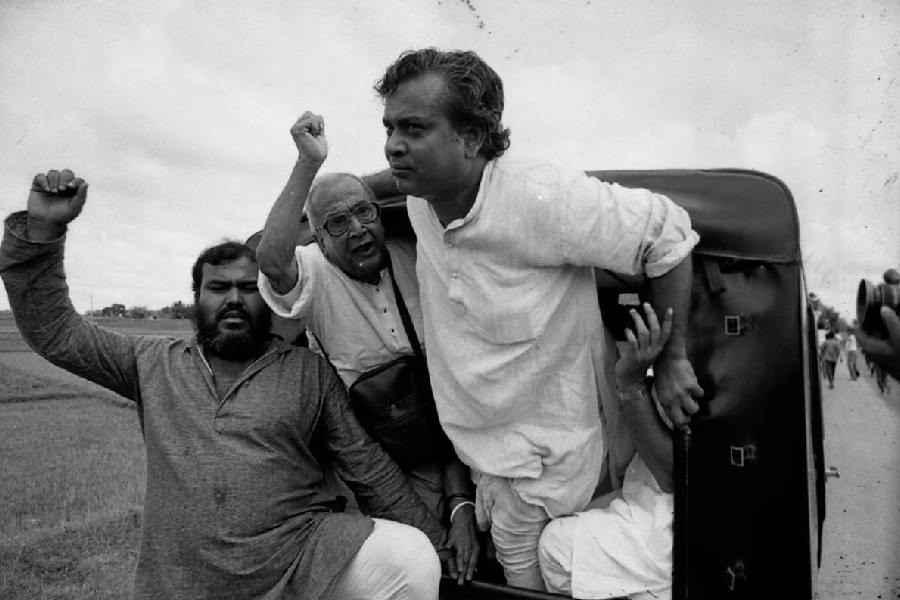All that 41/1 Bhupen Bose Avenue near Shyambazar in Calcutta boasts of today is a pair of shuttered shopfronts, a dimly-lit, cobweb-festooned staircase and a healthy population of locks. It is a ghost of a house.
Twenty-five years ago, the story was very different.
In 1998, this very address was attired in the cape of victory. It was home — rented — to Tapan Sikdar, the man who opened the BJP’s Lok Sabha innings in West Bengal.

The letterbox at the house in north Calcutta where Sikdar lived and worked.
Sikdar, the sole BJP representative among the 42 MPs the state sent to the short-lived 12th Lok Sabha, won the Dum Dum Lok Sabha seat.
Those days, Dum Dum was known as lal durgo, or red fort, for having sent the CPI(M)’s Nirmal Kanti Chatterjee to the Lok Sabha for three consecutive terms. In an interview soon after the 1998 general election results, MP and state BJP president Sikdar acknowledged that his victory did not just reflect people’s faith in the BJP but also their disaffection with the CPI(M) rule.
A major reason for Sikdar’s win was his connection with the common people. News reports from the time refer to his ability to appeal to all sections of society, his unique speeches. He spoke of rising expenses, missing infrastructure, lack of jobs. He spoke with empathy and wit. One of his lines — delivered among other places at a pre-election meeting in Rajarhat — was, “You are zamindars for you stand on the land, I am just a chowkidar (referring to the wooden platform or chowki he stood on).”
The BJP vote share in Bengal started climbing steadily once Sikdar became party president (1990-1995). Sikdar had an uncanny ability to remember people, says the BJP’s Sayantan Basu.
Samik Bhattacharya, spokesperson of the BJP’s state unit and a much younger colleague, agrees. According to him, Sikdar knew at least 10,000 party workers by name and had visited every village in Bengal. “Tapanda’s goal was to establish the BJP in the state and he did everything possible for it. He often worked from six in the morning to one at night. He rode to Krishnagar, to Nadia, to Ranaghat on his Bajaj Cub to hold meetings,” adds Bhattacharya. But what impressed Bhattacharya most was that no matter what post he held, at party conventions, while other leaders put up at hotels, Sikdar always stayed wherever the party workers did, be it a dormitory, a stadium or a tent.
Once Sikdar became an MP, and later minister of state, it was normal that his Calcutta home would become busy with comings and goings. A neighbour remembers that time. “They don’t make them like him anymore,” says the elder whose admiration for Sikdar does not extend to his party.
How Sikdar was so confident of his win in 1997 is a mystery to many. As Bhattacharya so eloquently put it, “We were in politics but Bengal politics had no space for us.” It was Sikdar’s seventh election and maiden win. His first most likely was in 1982, for the Jorabagan Assembly seat that he lost to the Congress’s Subrata Mukherjee. He got 50 per cent of the votes polled in Dum Dum. The difference with his nearest rival, the aforementioned CPI(M) candidate, was nearly one-and-a-half lakh votes.
Sikdar used to say that the seven lakh refugees had ensured his win.
Despite his own refugee roots — he was born and raised in Jessore, Bangladesh, till 1956, after which he moved to Malda — and his sympathy for them, Sikdar was most vocal against Bangladeshi infiltration. In an interview to a Bengali newspaper in 1994, he claimed there were 75 lakh illegal immigrants from Bangladesh. It was his raucous anti-infiltration campaign that culminated in India beginning to fence the Bangladesh border with barbed wire during Prime Minister Atal Behari Vajpayee’s tenure.
When Sikdar became minister of state for communications and information technology, when he was minister of state of chemicals and fertilisers, when he lost Dum Dum to the CPI(M) in 2004 and to the TMC in 2009, all through, his home in the real sense of the term was 41/1 Bhupen Bose Avenue.
In 2014, less than a month after the BJP’s win at the hustings, Sikdar died.
Sikdar had been suffering from diabetes for a long time. By the time of the 2014 elections, his kidneys had given up. He needed dialysis thrice a week. Yet, his nephew Sourav remembers, he travelled to Siliguri for electioneering between dialysis days. Sourav, who lived with Sikdar after he lost his own father, says the genial politician did not listen to entreaties to give it all a rest and continued to campaign vigorously.
Even as the BJP was celebrating its win in Delhi, Sikdar was hospitalised in Calcutta. Sourav says Narendra Modi himself called on Sikdar’s number to ask if he needed anything and even sent a plane to fly Sikdar to AIIMS Delhi.
When Sikdar died on June 2, Modi was abroad but the PMO ensured that Sikdar’s body was flown home with due ceremony. “He would have wanted to be cremated in Calcutta,” says Sourav.
Says Sayantan Basu, “It is said that Dilip Ghosh is the most successful state BJP president because of the number of seats the party won in the Assembly and Lok Sabha elections during his time. But I think Tapanda was more successful. He had no organisational support, no favourable wind, no party at the Centre to support him and he still managed to do what he did.”
If only houses could talk, what an engrossing story the one on Bhupen Bose Avenue would have to tell.











